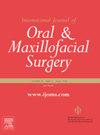Comparison of survival between palliative surgery and no surgery for advanced tongue squamous cell carcinoma: an analysis of SEER data
IF 2.2
3区 医学
Q2 DENTISTRY, ORAL SURGERY & MEDICINE
International journal of oral and maxillofacial surgery
Pub Date : 2025-01-01
DOI:10.1016/j.ijom.2024.07.001
引用次数: 0
Abstract
The aim of this study was to investigate the survival effect of palliative surgery in advanced tongue squamous cell carcinoma (TSCC). A retrospective analysis of data in the SEER database for 6151 patients with stage III/IV TSCC (American Joint Committee on Cancer (AJCC) staging), diagnosed between 2004 and 2015, was performed. The patients were divided into two groups: palliative surgery and no surgery. Kaplan–Meier and Cox proportional hazards regression analyses were applied to determine risk factors for overall survival (OS) and cancer-specific survival (CSS). A further analysis was performed using 1:1 propensity score matching (PSM) to balance 13 patient variables (sex, age at diagnosis, race, marital status, primary tumour site, SEER stage, AJCC stage, pathological differentiation grade, tumour size, lymph node metastasis, previous lymph node removal, radiotherapy, and chemotherapy). Among the 6151 patients, 706 underwent palliative surgery; the other 5445 did not undergo any kind of surgery. Those who underwent palliative surgery had a higher 5-year survival rate. After PSM, 1274 patients were included in the matched cohort. Multivariate Cox regression analysis showed that patients who underwent palliative surgery had a lower risk of death than those who did not (OS: hazard ratio 0.58, 95% confidence interval 0.49–0.69, P < 0.001; CSS: hazard ratio 0.60, 95% confidence interval 0.49–0.74, P < 0.001). In this comparative study it was found that compared with no surgery, palliative surgery has a positive impact on the survival rate of patients with advanced TSCC.
晚期舌鳞状细胞癌姑息手术与不手术的生存率比较:SEER 数据分析。
本研究旨在探讨晚期舌鳞状细胞癌(TSCC)姑息手术的生存效果。研究对SEER数据库中2004年至2015年间确诊的6151例III/IV期TSCC(美国癌症联合委员会(AJCC)分期)患者的数据进行了回顾性分析。患者被分为两组:姑息手术组和不手术组。采用卡普兰-梅耶(Kaplan-Meier)和考克斯比例危险回归分析来确定总生存期(OS)和癌症特异性生存期(CSS)的风险因素。此外,还使用 1:1 倾向评分匹配法(PSM)进行了进一步分析,以平衡 13 个患者变量(性别、确诊年龄、种族、婚姻状况、原发肿瘤部位、SEER 分期、AJCC 分期、病理分化等级、肿瘤大小、淋巴结转移、既往淋巴结切除、放疗和化疗)。在 6151 名患者中,706 人接受了姑息手术,其余 5445 人未接受任何手术。接受姑息手术的患者的 5 年生存率更高。经过PSM后,1274名患者被纳入配对队列。多变量 Cox 回归分析显示,接受姑息手术的患者死亡风险低于未接受姑息手术的患者(OS:危险比 0.58,95% 置信区间 0.49-0.69,P<0.05)。
本文章由计算机程序翻译,如有差异,请以英文原文为准。
求助全文
约1分钟内获得全文
求助全文
来源期刊
CiteScore
5.10
自引率
4.20%
发文量
318
审稿时长
78 days
期刊介绍:
The International Journal of Oral & Maxillofacial Surgery is one of the leading journals in oral and maxillofacial surgery in the world. The Journal publishes papers of the highest scientific merit and widest possible scope on work in oral and maxillofacial surgery and supporting specialties.
The Journal is divided into sections, ensuring every aspect of oral and maxillofacial surgery is covered fully through a range of invited review articles, leading clinical and research articles, technical notes, abstracts, case reports and others. The sections include:
• Congenital and craniofacial deformities
• Orthognathic Surgery/Aesthetic facial surgery
• Trauma
• TMJ disorders
• Head and neck oncology
• Reconstructive surgery
• Implantology/Dentoalveolar surgery
• Clinical Pathology
• Oral Medicine
• Research and emerging technologies.

 求助内容:
求助内容: 应助结果提醒方式:
应助结果提醒方式:


